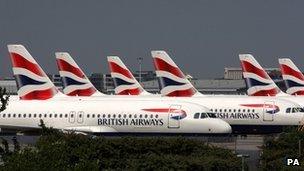BA says it will cut back on hiring due to air duty rise
- Published

British Airways is one of the airlines calling for the tax to be scrapped
British Airways has said it will take on fewer people next year as a result of the government's planned 8% rise in Air Passenger Duty (APD).
BA said next April's tax rise meant it would hire about 400 people, not 800.
Willie Walsh, boss of BA parent company International Airlines Group (IAG), said the harm to the economy exceeded the revenue that would be raised.
A Treasury spokesman said the aviation sector had to "play its part" in restoring the public finances.
Next year's tax rise comes after the government froze the level of APD in 2011.
BA said it had planned to take on 800 staff in 2012, but this would now be cut in half, and that the airline would also review plans to bring in an extra Boeing 747.
"I believe that this tax is actually doing more harm than good, I believe the impact on the economy is significantly greater than the tax revenue the chancellor is looking at," said IAG chief executive Willie Walsh.
"And that's why we've called for an independent review of APD to fully assess what the negative impact on the economy is."
Many airlines say APD should be scrapped, arguing that a rise will damage chances of an economic recovery.
'Sham' consultation
The prime minister's official spokesman said the government was "clearly disappointed" by the British Airways announcement on jobs.
However, the PM's spokesman said the government raised £2.5bn through APD which was important to dealing with its financial deficit.
A Treasury spokesman said: "The government has been consistent that the aviation sector must play its part in reducing the deficit and restoring the public finances," said
"It is worth noting that unlike other European countries, the UK does not levy VAT on domestic flights and aviation fuel is not taxed. The aviation industry will also benefit from the cut in corporation tax."
The APD changes next year will also see it extended to private business jets for the first time.
The amount of APD that passengers have to pay depends upon whether their flight is short or long-haul, with business and first-class travellers having to pay more than those with an economy ticket.
Under the new rates economy-class passengers flying no further than 2,000 miles will see their APD rise from £12 to £13 per passenger.
Longer flights up to 4,000 miles will see an increase from £60 to £65, flights between 4,000 and 6,000 miles will rise from £75 to £81 and the tax on economy flights above 6,000 miles - such as trips to Australia - will rise from £85 to £92.
At the start of November APD was reduced for direct long-haul flights from Northern Ireland, in response to competition from services in the Irish Republic, which has an Air Travel Tax of just three euros to any destination.
The tax sparked a moment of unity between rival airlines last month.
Bosses of Easyjet, Ryanair, Virgin Atlantic and IAG signed a joint letter criticising the increase.
The letter called the government's consultation on APD "a sham and a waste of taxpayers' money".